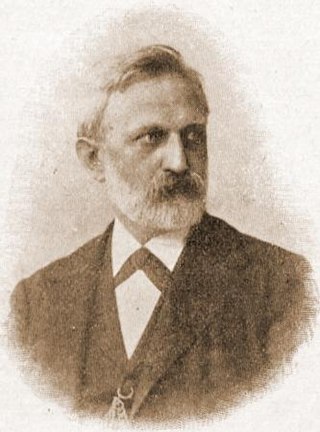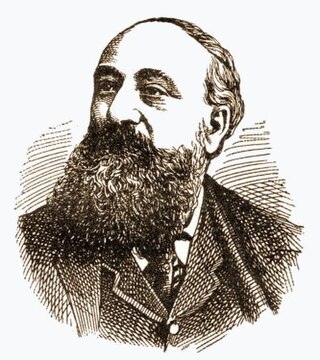
The World Chess Championship is played to determine the world champion in chess. The current world champion is Gukesh Dommaraju, who defeated the previous champion Ding Liren in the 2024 World Chess Championship.

William Steinitz was a Bohemian-Austrian, and later American, chess player. From 1886 to 1894, he was the first World Chess Champion. He was also a highly influential writer and chess theoretician.

Karl Ernst Adolf Anderssen was a German chess master. He won the great international tournaments of 1851 and 1862, but lost matches to Paul Morphy in 1858, and to Wilhelm Steinitz in 1866. Accordingly, he is generally regarded as having been the world's leading chess player from 1851 to 1858, and leading active player from 1862 to 1866, although the title of World Chess Champion did not yet exist.

Johannes Hermann Zukertort was a Polish-born British-German chess master. He was one of the leading world players for most of the 1870s and 1880s, but lost to Wilhelm Steinitz in the World Chess Championship 1886, which is generally regarded as the first World Chess Championship match. He was also defeated by Steinitz in 1872 in an unofficial championship.

Mikhail Ivanovich Chigorin was a Russian chess player. He played two World Championship matches against Wilhelm Steinitz, losing both times. The last great player of the Romantic chess style, he also served as a major source of inspiration for the "Soviet chess school", which dominated the chess world in the middle and latter parts of the 20th century.

Joseph Henry Blackburne was a British chess player. Nicknamed "The Black Death", he dominated the British scene during the latter part of the 19th century. Blackburne learned the game at the relatively late age of 17 or 18, but he quickly became a strong player and went on to develop a professional chess career that spanned over 50 years. At one point he was one of the world's leading players, with a string of tournament victories behind him, and popularised chess by giving simultaneous and blindfold displays around the country. Blackburne also published a collection of his own games.

Szymon Abramowicz Winawer was a Polish chess player who won the German Chess Championship in 1883.
The Oxford University Chess Club (OUCC) was founded at the University of Oxford in 1869. It is the oldest university chess club in the United Kingdom. The Club meets each Wednesday evening during University term time. They field two teams in the Oxfordshire Chess League.

Samuel Rosenthal was a Polish-born French chess player. Chess historian Edward Winter wrote, "He dedicated his life to chess-playing, touring, writing, teaching and analysing. Despite only occasional participation in first-class events, he scored victories over all the leading masters of the time. He also acquired world renown as an unassuming showman who gave large simultaneous displays and blindfold séances, invariably producing a cluster of glittering moves."

George Henry Mackenzie was a Scottish-born American chess master.

Emil Schallopp was a German chess master and author. He became head of the shorthand department of the Reichstag. He wrote many books, including one on the Steinitz–Zukertort 1886 World Championship match. He is best known today as an author, particularly of the seventh edition (1891) of the Handbuch des Schachspiels.

The World Chess Championship 1886 was the first official World Chess Championship match contested by Wilhelm Steinitz and Johannes Zukertort. The match took place in the United States from 11 January to 29 March, the first five games being played in New York City, the next four being played in St. Louis and the final eleven in New Orleans. The winner was the first player to achieve ten wins. Wilhelm Steinitz won the match 10–5, winning his tenth game in the twentieth game of the match. There were five draws.

London 1851 was the first international chess tournament. The tournament was conceived and organised by English player Howard Staunton, and marked the first time that the best chess players in Europe would meet in a single event. Adolf Anderssen of Germany won the sixteen-player tournament, earning him the status of the best player in the world.

The fourth World Chess Championship was held in Havana from 1 January to 28 February 1892. Defending champion William Steinitz narrowly defeated challenger Mikhail Chigorin.
The American Chess Congress was a series of chess tournaments held in the United States, a predecessor to the current U.S. Chess Championship. It had nine editions, the first played in October 1857 and the last in August 1923.

The 1975 World Chess Championship was not played due to a dispute over the match format. Champion Bobby Fischer was to play Anatoly Karpov in Manila, commencing June 1, 1975. Fischer refused to play the then-standard "Best of 24 games" match and, after FIDE was unable to work out a compromise, forfeited his title instead. Karpov was named World Champion by default on April 3, 1975.

The second international Vienna 1882 chess tournament was one of the longest and strongest chess tournaments ever played. According to the unofficial Chessmetrics ratings, the tournament was the strongest tournament in history, on the basis that nine of the ten top players in the world participated, including all of the top eight.

George Hatfeild Dingley Gossip was an American-English chess master and writer. He competed in chess tournaments between 1870 and 1895, playing against most of the world's leading players, but with only modest success. The writer G. H. Diggle calls him "the King of Wooden Spoonists" because he usually finished last in strong tournaments.
The Paris 1878 chess tournament took place from 17 June to 31 July 1878 during the Paris World Expo. The participation of George Henry Mackenzie and James Mason made it the first intercontinental tournament in Europe. Eleven double rounds were played. Wilhelm Steinitz was present as reporter for The Field.

William Norwood Potter was an English chess master and writer. He is primarily remembered for the quality of his chess journalism, and for his association with Wilhelm Steinitz, the first winner of a world chess championship match.














